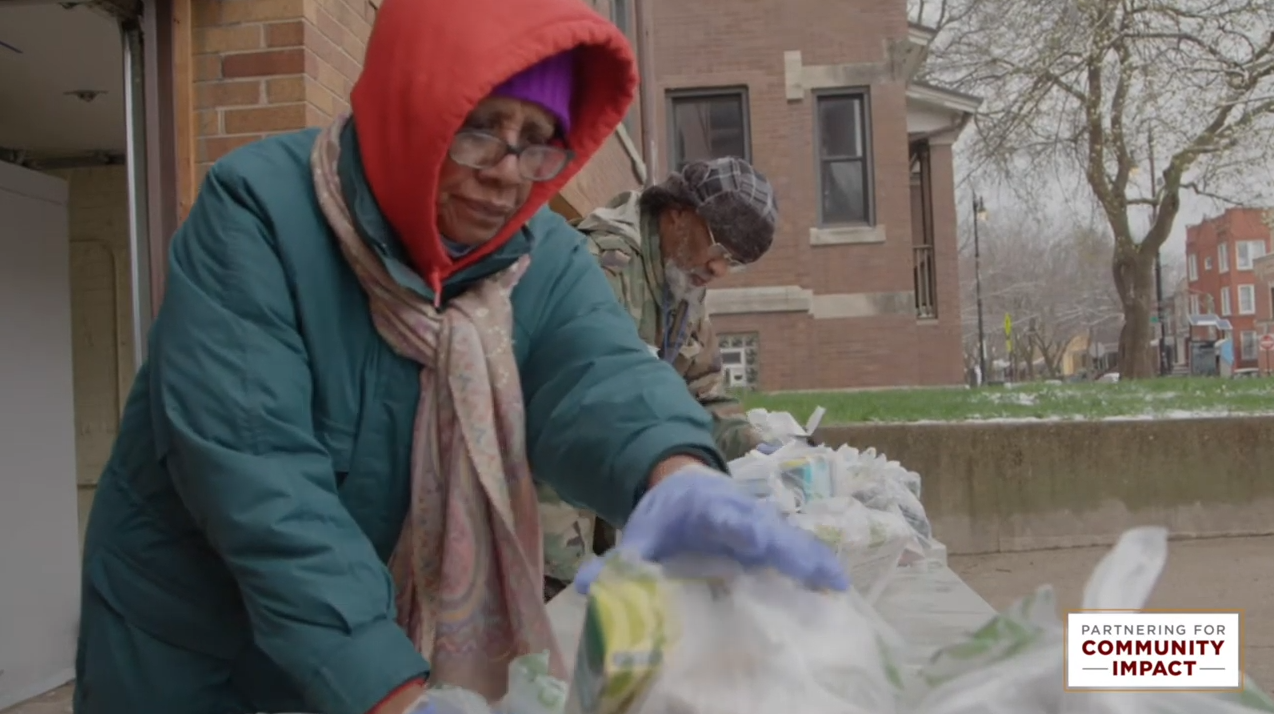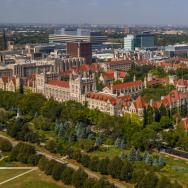Food insecurity has long been a problem in the Greater Grand Crossing neighborhood, but Father Matthew O’Donnell, who oversees St. Columbanus’ food pantry on the South side of Chicago, says the challenge became even greater during the COVID-19 crisis. Residents are facing job loss and health issues due to the pandemic, and some food pantries and soup kitchens have temporarily closed. The Greater Chicago Food Depository saw a 40 percent spike in demand in March compared to the same time last year, while the amount of donated food they received dropped by 30 percent.
“Other food pantries are closing and they’re directing people to us. I’m seeing a lot of new faces in line each week,” O’Donnell said.
St. Columbanus is one of 28 sites across the South Side where community members struggling to feed themselves or their families can pick up meals prepared and distributed by the University of Chicago as part of the University’s Community Support Initiative. This week, UChicago Dining workers—many of whom are South Side residents—prepared and, in partnership with the Greater Chicago Food Depository, distributed the 150,000th meal to these sites since the University launched the initiative on March 30.
“It’s encouraging for our volunteers to see this food from the University coming in,” O’Donnell said. “There’s a sense that we’re not in this alone.”
Using existing University infrastructure and dining facilities, UChicago Dining workers are preparing and distributing breakfasts, lunches, and dinners to sites in each of the nine South Side neighborhoods in the University’s focus area (Douglas, Grand Boulevard, Greater Grand Crossing, Hyde Park, Kenwood, Oakland, South Shore, Washington Park and Woodlawn). The effort, set to continue through mid-June, is intended to help bridge the gap in services with immediate assistance as public and private sector responses are fully mobilized.
“The impact of the COVID-19 crisis on our city has been profound, particularly on Chicago’s families and communities who were already struggling with access to basic needs like health care, jobs, education and food,” said Mayor Lori E. Lightfoot. “Despite these many challenges, our city has remained resilient, thanks to the incredible work and dedication of institutions like the University of Chicago and its many partners across our city, all of whom have stepped up to serve our city’s residents in their time of great need. Though we still have far to go before our lives return to normal, we will recover from this crisis stronger and more prosperous than we have ever been, thanks to the outstanding work being done every day across Chicago.”
“Despite these many challenges, our city has remained resilient, thanks to the incredible work and dedication of institutions like the University of Chicago.”
“This program builds on the University’s longtime commitment to the people of the South Side. By working closely with partners like the Greater Chicago Food Depository, we have been able to get this program up and running quickly as a lot of our neighbors don’t have time to wait,” said Derek Douglas, UChicago’s Vice President for Civic Engagement and External Affairs. “During this time of significant need and uncertainty, we hope these efforts are helping to reduce the burden so many in our shared community are carrying.”
“This partnership is putting food into the hands of people who need it during an unprecedented time,” said Kate Maehr, executive director and CEO of the Greater Chicago Food Depository. “We thank the University for generously using their facilities and dining team to provide nourishing meals for the community, allowing us to reach more people in need.”

As the program has scaled up since its launch, it has added multiple sites and joined with new partners. For instance, a new partnership with the Chicago chapter of the National Alliance on Mental Illness will connect South Siders who call NAMI with food insecurity concerns to University-provided meals, delivered by students from UChicago’s Pritzker School of Medicine.
The meal program is just one element of the Community Support Initiative, which includes more than $680,000 in emergency bridge grants from the University to 182 South Side small businesses; $310,000 in rent relief and grants to the University’s small business tenants, $400,000 in grants and organizational help to 79 community-based nonprofits on the South Side; and a campaign to support local UChicago Medicine health care workers on the frontlines of confronting this crisis, as well as the patients and families who are affected.
To see a full listing of public food distribution sites and schedules, visit the University’s COVID-19 Community Support website.
—Story was first published on the Office of Civic Engagement website.










